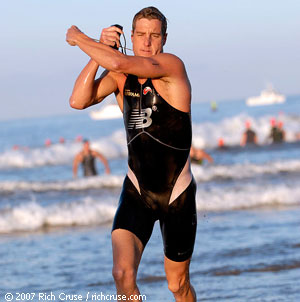Greg Bennett racing for the USA
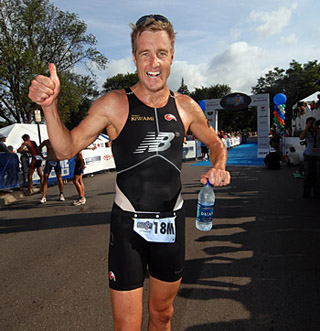
Greg Bennett is forsaking the green and gold of Australia for the red white and blue of the USA with an eye on the London Olympics. GB is 38 and after years of marriage to his American-born wife and highly decorated fellow triathlete Laura, the King of the Toyota Challenge and Life Time Fitness series is on the verge of attaining American citizenship to go with his Aussie passport.
While considering the final goals in a 20-year, Hall of Fame triathlon career, Bennett says that winning another Life Time Fitness crown, an Ironman 70.3 World title and an appearance at Ironman Hawaii are on his bucket list. But after a decade of chasing the Olympic dream on separate paths, his fondest dream is for he and his lovely talented wife Laura to earn spots in the 2012 Olympics on the same national team.
Far from any arrogant presumptions, Bennett makes it clear that he faces a steep uphill battle to earn a spot against a rising tide of American talent – and at the advanced triathletic age of 40. But if you can’t wish upon a star, what’s a heaven for?
Slowtwitch: How does the prospect of competing for the USA feel?
Greg Bennett: For me it is really exciting, the final chapter if you like of some things Laura and I wanted to do together. After contemplating this for several years, I said ‘Let’s do it.’
ST: How was this idea born?
Greg: In ‘06 and ’07, Laura and I discussed this idea. At that time, it did not feel quite right. Going into the ‘08 Olympic qualification process, I felt it was best to stay put a little bit longer. During this past off season break in November and December, we talked what we want to do now. Along with all of our long term goals, I agreed with Laura — ‘Yeah another Olympics.’ I had been thinking: What do I want to do in my life? For me a number of things are on the plate; Win a 70.3 title and another Life Time Fitness title and get a spot in Hawaii. But in addition to that what would be a really cool experience would be to take the Olympic journey with Laura.
ST: Some people say that making the Australian triathlon team is the toughest ticket into the Olympics. Is part of your reasoning that making the American team might be a bit easier?
Greg: This is not by any means to say making the American team would be easy. Right now, it is probably harder than making the Australian men’s team in 2012. What Laura and I learned about the Olympics in the last 10 years is that the quest to make the Olympics is about the journey. And we decided it would be a thing to consider.
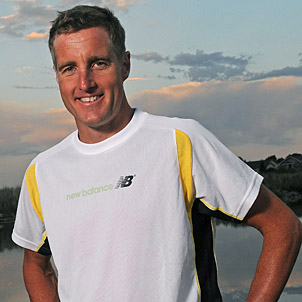
ST: How good are the American men?
Greg: The American men’s team is loaded with quality athletes. They have mature champions like Hunter Kemper and Matt Reed and Andy Potts and obviously Jarrod Shoemaker has reached the top level last year. They also have many impressive younger competitors like Matt Chrabot and Ben Collins. And now Tim O’Donnell, after his success at the 70.3 distance, is taking another shot. At the end of the day, the USA has a very strong team and I am excited to be a part of it.
ST: In its proud history, Australia has produced many triathlon stars who have dual citizenship and have competed for several other countries – notably including 2004 Olympic champion Kate Allen. Some have been criticized Down Under for residing in the US in order to make a living. Do you have pangs of regret competing for another country?
Greg: Look, every individual from Australia is unique. All their stories are a little different. I can’t speak on Michellie [Jones] and Welchy [Greg Welch], who have brought great honor to Australia and live in the USA. As an Australian-American, I have family in the USA and feel very much a part of it. My situation is quite different than just making a career in the USA. The biggest decision for me is family. Career, sponsors and media are one thing. But the really big thing for me is my wife is an American and we like to think there is one big final chapter in our triathlon careers we want to experience together. We’d like to think we can make it happen.
ST: You both have had a lot of highs and lows in your separate Olympic quests. What is the lure of trying to make the same team?
Greg: The last 10 years we both went for to the Olympics separately and as luck would have it we both got 4th.in our one shot so far. For me, we are married and we both want an Olympic experience together to remember forever. So this decision just felt right.
ST: You both have had some heartbreak, about not making the teams. Your situation involved coming up short with some legal wrangling in 2000 and making the third spot in ’08 but getting shut out when Australians did not accumulate enough points to earn three national starting slots. Did dissatisfaction with Triathlon Australia play any part in your decision?
Greg: There wasn’t any political animosity whatsoever. I feel I left Triathlon Australia on good terms. They are in good hands now. They have a good coach, a good high performance leader and the government has given it some good dollars. I wish them the very best. At the same time, my decision feels right.
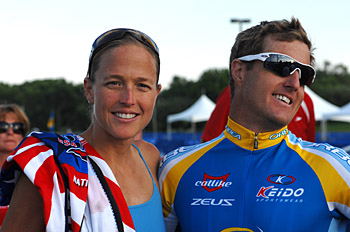
ST: In 2012, you will hit 40 and as far as I can remember only Rob Barel, who competed at Sydney at age 42, has competed in Olympic triathlon past the age of 40. Do you have a chance?
Greg: I’m no spring chicken. I’m 38 now.
ST: You look 28.
Greg: Thanks Tim. I still love the sport … I’m healthy and training hard and one of those things I love about triathlon is the challenge. The challenge of making the Olympic Games as a 40 year will be incredibly difficult. I know that the road I am on will be full of challenges because I set the bar for myself very high. And this sport is full of them.
ST: You don’t seem to be losing your core speed. Even though you were fighting some injuries last year and did not dominate the Toyota Challenge/Life Time Fitness series, you whipped the field decisively at New York when you were on top of your game. What about now?
Greg: I had a 7th at Sydney this year in the World Championship Series opener and I was pleased with it. That said, I was not over the moon. I like to win but I was 7th after a long time away from ITU racing. So it was a nice place to start for me. My task now is balancing two styles of racing – ITU draft legal along with my non-drafting racing in the USA. My plan is to keep in touch with ITU racing from now on. It has the hardest competition. No offense to other forms like Ironman and 70.3. But the longer the race, the challenge changes. In long course, the actual event is tough. Whereas the shorter you go, the event itself may be easier in distance but it is made tough because of the speed and intensity and standard of competition.
ST: Which is tougher?
Greg: In brief, there is no easy way or direction to go — long or short. When there are 90 guys on the start line of a World Cup or World Championship Series event, the standard is now extremely high. When I look at Ironman, you probably realize there are 15 guys who might win. So it is a different sort of math. In an Ironman, to do that distance alone is incredibly tough. We were talking about it the other night at dinner. When you go to an Ironman you have a different parameter for success than you do with ITU draft legal races.
ST: Speaking of higher standards of competition, ITU racers like Alistair Brownlee and Javier Gomez have been timed in the low 29 minutes running the final 10k of Olympic distance events. Even if those runs are at times short of the advertised distances, the standards of the ITU runs are higher than ever. Recently Tim Don finished a road race 10k under 29 minutes and within one minute of the legendary Haile Gebrselassie, which makes the 29-minute mark in triathlon at least plausible.
Greg: Tim Don’s was an impressive run. In all fairness to the ITU, while I get a little disappointed when they are not 100 percent accurate, I think the top runners really are approaching that standard. While international road races have accurately measured courses, ITU triathlons most often have four lap runs. A fair run race should have no dead stop U-turns as we do many times in ITU races. Those kinds of turns slows the overall time by 3-5 seconds each, so as much as distances are off in ITU, sometimes by as much as a quarter mile, when you add up the dead stop U-turns, they almost balance out to a pretty accurate time for the 10k.
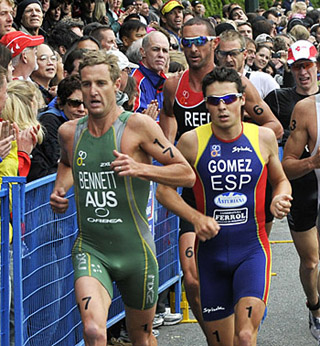
ST: You have been racing and training the best in the sport at the Olympic distance for nearly 20 years. How good are the current crop of competitors?
Greg: I have been lucky to have trained with the best in the sport at various times. Just recently I trained with Javier Gomez for a few months in Australia. I tell you, his run form is on par with Tim Don’s and Alistair Brownlee. When we did 1, 2 and 3k repeats together – they were on a pace that scares the hell out of me. To match Javier will be an exciting task.
ST: Does this surge in 10k times say something about the quality of ITU draft legal racing?
Greg: Absolutely. I think I’ve trained at some time with every great athlete in the sport in the last 20 years. I won’t mention names because I do not want to put down anyone. But I spent time with Javier Gomez this past Australian summer and I have never trained with such a genetic freak — and obviously a hard worker, too. I can’t put him as simply gifted. He is also maximizing his talents. Just watch him swim a long course 1500 at the end of a long weekend of training. To see him cruise a 17-minute 1500 swim without any effort was a Whoah! Moment for me. I wish he were not such a nice guy. It’s hard to dislike him enough to find the fuel to beat him.
ST: Can you tell us about your three very different Olympic quests?
Greg: In 2000, Triathlon Australian rules held a previous performance clause and Miles Stewart won the world title in 1991, so that trumped my finishing ahead of him in Australia’s final qualifying race at the 2000 ITU World Championship in Perth.
For Athens I had been ranked number 1 for most of 2002 and 2003. But the Aussies wanted me to do trials in January of 2004, our natural off-season. Fortunately I pulled a race out of my ass in ‘04 and made the Olympic team and took a 4th.
In ‘08 I was focused on the Life Time Fitness series where I won all the races in ‘07. In ‘08 I wanted to see if I could make the Australian Olympic team but on my terms. So at the beginning of the 2008 season, I did a World Cup in Australia and performed well, so the selectors put me on the ‘08 Olympic team. Unfortunately I could not go because the Australian men didn’t make enough points to qualify three men for starting spots for Beijing.
ST: What did you do instead?
Greg: I did commentary work for the BBC and supported Laura as much as I could in the time in between work assignments.
So I have had three very different interesting stories with 3 Olympics. This fourth one will be very different once again. I will be 39 or 40. So to make the team will no doubt be very hard. No doubt it will be incredibly hard. I am definitely NOT sitting here thinking it will be a breeze for me. Every Olympics is a special experience and every time it is a challenge to simply make the team.
ST: What are the technical hurdles remaining to switching to the US team? I imagine you have to achieve American citizenship first of all?
Greg: I am on track to gain American citizenship in June since I have been married to Laura for the required time and I have passed all the requirements. Then USA Triathlon has to accept me and Australia needs to release me. Now we are waiting for the ITU board meeting in the beginning of June to start the Olympic Games qualifying process.
ST: Good luck!


